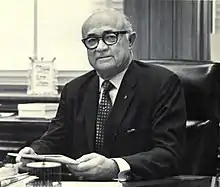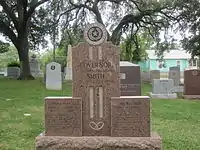Preston Smith (governor)
Preston Earnest Smith (March 7, 1912 – October 18, 2003) was the 40th Governor of Texas from 1969 to 1973, who previously served as the lieutenant governor from 1963 to 1969.
Preston Smith | |
|---|---|
 | |
| 40th Governor of Texas | |
| In office January 21, 1969 – January 16, 1973 | |
| Lieutenant | Ben Barnes |
| Preceded by | John Connally |
| Succeeded by | Dolph Briscoe |
| 35th Lieutenant Governor of Texas | |
| In office January 15, 1963 – January 21, 1969 | |
| Governor | John Connally |
| Preceded by | Ben Ramsey |
| Succeeded by | Ben Barnes |
| Member of the Texas State Senate from District 28 (Lubbock) | |
| In office 1957–1963 | |
| Preceded by | Kilmer B. Corbin |
| Succeeded by | H.J. "Doc" Blanchard |
| Member of the Texas House of Representatives from District 119 (Lubbock) | |
| In office 1945–1951 | |
| Preceded by | Hop Hasley |
| Succeeded by | Waggoner Carr |
| Personal details | |
| Born | Preston Earnest Smith March 8, 1912 Corn Hill (now Jarrell), Texas, U.S. |
| Died | October 18, 2003 (aged 91) Lubbock, Texas, U.S. |
| Resting place | Texas State Cemetery (Austin, Texas) |
| Nationality | American |
| Political party | Democratic |
| Spouse(s) | Ima Mae Smith
(m. 1935; died 1998) |
| Children | 2 |
| Alma mater | Texas Tech University |
| Profession | Entrepreneur; politician |
Early life
Smith was born into a tenant farming family of thirteen children in Corn Hill, a town in Williamson County, Texas that has since been absorbed into nearby Jarrell.[1][2][3] The family later moved to Lamesa, Texas, where Smith graduated in 1928 from Lamesa High School. In 1934, he graduated from Texas Technological College (now Texas Tech University) in Lubbock with a bachelor's degree in business administration.[2] Staying in Lubbock, he founded a movie theater business and invested in real estate.[2][4]
Political career

Smith was first elected to the Texas House of Representatives in 1944 and then to the Texas State Senate in 1956. He won the Senate seat by defeating in the primary the incumbent Kilmer B. Corbin, the father of actor Barry Corbin. In 1962, Smith won the lieutenant governor's race, securing majorities in all but 16 of the 254 counties to defeat the Republican O.W. "Bill" Hayes.[5]
In 1968, Smith was elected governor, a position he held for two two-year terms. He succeeded the popular Democratic Governor John B. Connally, Jr., who later switched to the Republican Party in 1973. To win the governorship, Smith first defeated Don Yarborough in the 1968 Democratic runoff election. Several other candidates, including Dolph Briscoe, a large landholder from Uvalde in the Texas Hill Country, and former Texas Attorney General Waggoner Carr, also of Lubbock, were eliminated in the primary.
Smith's inauguration on January 21, 1969, had what was called "the flavor of the South Plains." The Texas Tech University marching band led the parade just behind the marshal and the color guard. A mounted masked Red Raider rode with the band. Governor and Mrs. Smith, both Tech graduates, followed in an open convertible. Other Smith family members rode in the parade, followed by the new lieutenant governor, Ben Barnes. The band of Lamesa High School, Smith's alma mater, was the first among the high school groups. Before the oath taking, the first to be televised in Texas history, Smith had been feted with a $25-per-place victory dinner in the Austin Municipal Auditorium, now the Long Center for the Performing Arts.[6]
Smith twice defeated Republican nominee Paul W. Eggers, a tax attorney from Wichita Falls and later Dallas, and a close friend of U.S. Senator John G. Tower. In the high-turnout general election of 1968, Smith received 1,662,019 ballots (57 percent) to Eggers' 1,254,333 (43 percent). In the general election of 1970, Smith, who had been unopposed in the Democratic primaries, received 1,197,726 votes (53.6 percent) to Eggers' 1,037,723 (46.4 percent) - still the highest midterm year turnout in past 50 years.[7] The state switched to four-year terms in 1974, two years after Smith left office.
In 1971 and 1972, Smith was embroiled in the Sharpstown scandal stock fraud scheme, which eventually led to his downfall. Smith lost his third-term bid for the governorship of Texas to Dolph Briscoe of Uvalde in the Democratic primary in 1972. He ran a distant fourth in the primary, behind Briscoe, women's activist Frances "Sissy" Farenthold of Corpus Christi, and Lieutenant Governor Ben Barnes, formerly of Comanche County.
Among his appointments, Smith in 1970 named Paul Pressler of Houston, a former state representative, as judge of the Texas 133rd District Court in Harris County. Pressler, who later switched to the Republican Party, subsequently became known as a prime leader in the Southern Baptist Convention Conservative Resurgence which began in Houston in 1979.[8]
He appointed former State Senator Grady Hazlewood of Amarillo and Austin as a regent of Hazlewood's alma mater, West Texas A&M University in Canyon.[9] In 1969, Smith named state Representative Randy Pendleton of Andrews to head the Office of State and Federal Relations in Washington, D.C.[10]
Later life and attempted political comeback
In 1974, Smith joined banker Stanton Leon Koop (1937–2008), a native of Pampa, in forming the West Texas Savings Association in Lubbock. In 1986, Koop moved to Dallas, where he was affiliated with Great Western Mortgage Company, until his retirement in 1994.
In 1978, at the age of sixty-six, Smith again entered the Democratic gubernatorial primary against his intraparty rival, Governor Briscoe. Both Smith and Briscoe lost in the primary to former Texas Supreme Court Chief Justice John Hill, who in turn was narrowly defeated in the general election by Republican Bill Clements.
Toward the end of his life, Smith worked as a political liaison officer for Texas Tech University. After his death in Lubbock, the airport was renamed in 2004 in his memory as Lubbock Preston Smith International Airport.

Smith termed himself a "conservative Democrat"; although he was generally supportive of President Lyndon B. Johnson, he refused to support his party's nominees for president in 1980 and for governor in 1982. Instead of voting to reelect President Jimmy Carter and Mark White in the gubernatorial race, Smith cast his ballot for Ronald Reagan and Bill Clements, respectively.[2]
On October 18, 2003, Smith died at age 91 in the Texas Tech University Medical Center in Lubbock after being hospitalized for pneumonia. He is interred with his wife, the former Ima Mae Smith (1911–1998), at the Texas State Cemetery in Austin.[2]
References
- Stiles, Matt (October 18, 2003). "Former Gov. Preston Smith dies". The Dallas Morning News. Archived from the original on February 20, 2005. Retrieved September 5, 2020.
- Robison, Clay (October 18, 2003). "Ex-Gov. Preston Smith, 'proud Texan,' dies at 91". Houston Chronicle. Archived from the original on October 20, 2003. Retrieved September 5, 2020.
- "New Corn Hill, Texas". Texas Escapes. Retrieved September 5, 2020.
- Slaughter, George. "Smith, Preston Earnest (1912–2003)". Texas State Historical Association. Retrieved September 5, 2020.
- Charles Ashman, Connally: The Adventures of Big Bad John, New York: William Morrow Company, 1974, p. 22
- "1969: Smith's inaugural celebration to have flavor of South Plains". Lubbock Avalanche-Journal. January 27, 2017. Retrieved April 3, 2017.
- https://www.statesman.com/news/20181107/texas-midterm-voter-turnout-highest-since-1970
- William H. Brackney, Historical Dictionary of the Baptists, p. 455. Lanham, Maryland: Scarecrow Press, 2009, ISBN 978-0-8108-5622-6. 13 April 2009. ISBN 9780810862821. Retrieved September 30, 2013.
- "Robyn Followwill-Line, "Grady Hazlewood"". Amarillo Globe News, May 19, 2000. Retrieved April 17, 2010.
- "Randall George Pendleton obituary". cemetery.state.tx.us. Retrieved December 17, 2010.
- Kinch, Jr., Sam; Procter, Ben (1972). Texas Under a Cloud: Story of the Texas Stock Fraud Scandal. Jenkins.
External links
- Programs for people, by Preston Smith, published 1973, hosted by the Portal to Texas History.
- http://www.lubbockonline.com/stories/020508/obi_243811655.shtml
- Papers, 1930-1975 and undated, in the Southwest Collection/Special Collections Library at Texas Tech University
| Party political offices | ||
|---|---|---|
| Preceded by John Connally |
Democratic nominee for Governor of Texas 1968, 1970 |
Succeeded by Dolph Briscoe |
| Texas House of Representatives | ||
| Preceded by Hop Halsey |
Member of the Texas House of Representatives from District 119 (Lubbock) 1945–1951 |
Succeeded by Waggoner Carr |
| Texas Senate | ||
| Preceded by Kilmer B. Corbin |
Texas State Senator from District 28 (Lubbock) 1957–1963 |
Succeeded by H. J. "Doc" Blanchard |
| Political offices | ||
| Preceded by Ben Ramsey |
Lieutenant Governor of Texas January 15, 1963–January 21, 1969 |
Succeeded by Ben F. Barnes |
| Preceded by John Connally |
Governor of Texas January 21, 1969-January 16, 1973 |
Succeeded by Dolph Briscoe |


